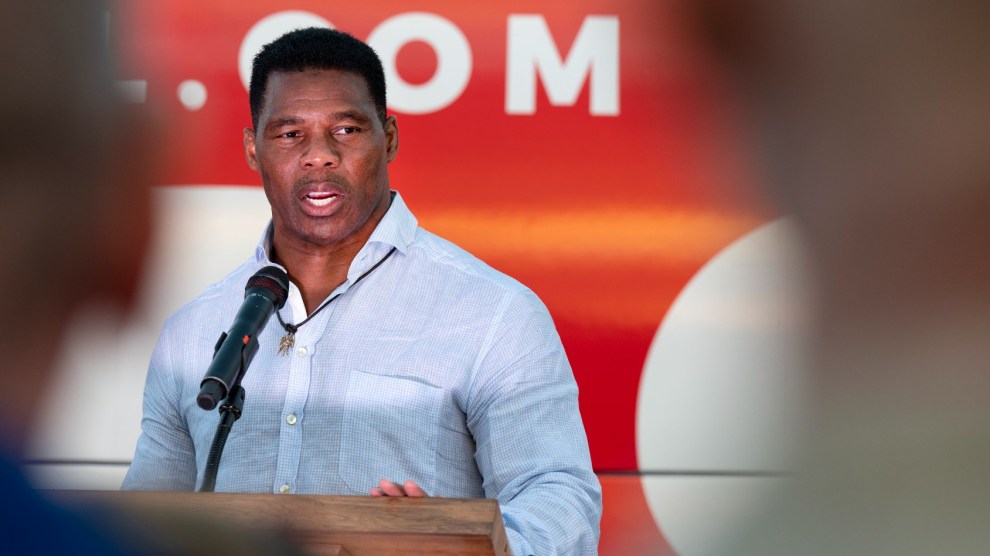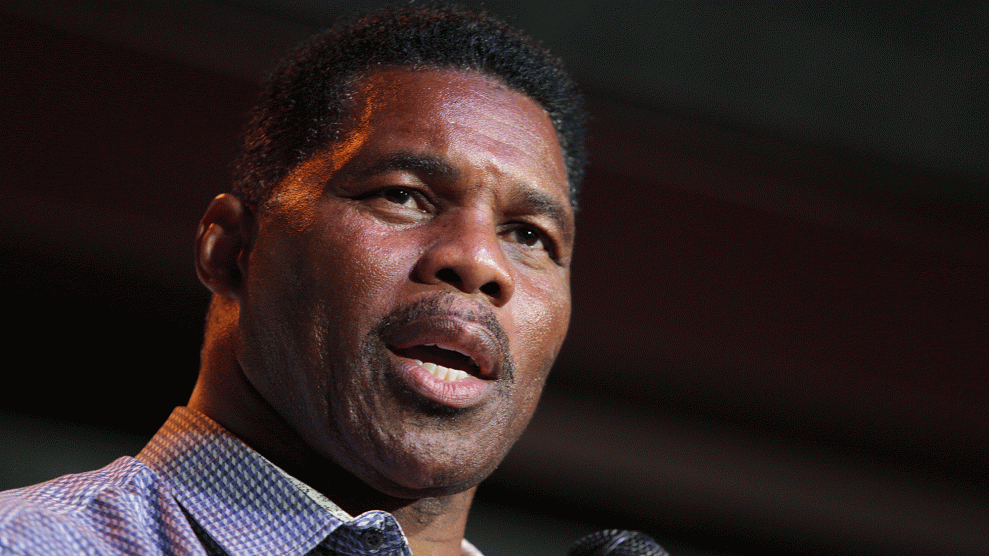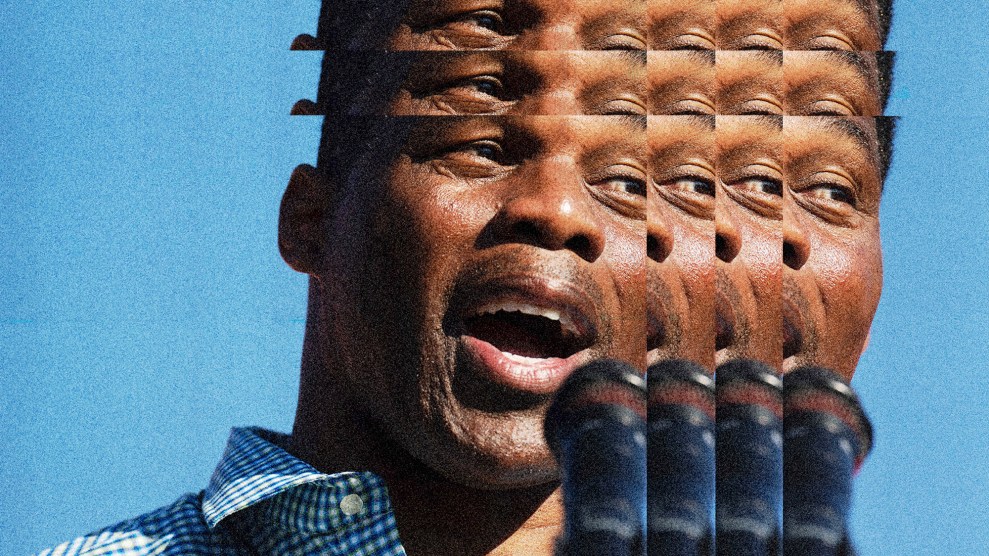
Herschel Walker speaks during a campaign rally in Greensboro, Georgia, on November 29.John Bazemore/AP
Not too long ago, Herschel Walker said he had experienced racism, having been stopped and harassed by the police because he was a Black man. And he expressed his fear that police will abuse his son because he’s Black. Yet during his campaign for Senate in Georgia, Walker, the Republican now in a December 6 runoff against Democratic incumbent Raphael Warnock, has repeatedly declared that racism does not exist in the United States. This is all part of a confusing series of remarks about American racism that Walker has made in recent years.
In July 2020, a year before he would announce his Senate bid, Walker appeared on the podcast of David Harris Jr., a Black conservative, and discussed assorted matters relating to race. Referring to his son, Walker noted that he was “afraid if the police stop him because he’s Black.” Moreover, Walker recalled his own troubling encounters with law enforcement officers: “I’ve been stopped by the police. I’ve been harassed by the police before.” Discussing one incident when he was pulled over by cops, he said, “Why in the world are you gonna stop me? Because I’m Black and drive an SUV? And then they saw my name and they said, ‘Oh well, I’m sorry.’ And I said, ‘I know what it was.'”
Walker told Harris he was upset by this episode: “Was I hurt? Yes. Was I mad? Yes.” He characterized the event as racial profiling. Though he was not yet a Senate candidate, he said that he wanted to “change that mentality [of the police] by going to Washington and getting more money into training police officers.” The goal was to address racism: “Put the programs in place so that [the police] can see that all Black men are not monsters. All Black men, when you meet them, are not monsters. All Hispanic kids are not monsters. That we’re not all criminals.”
During this interview Walker also expressed his support for Donald Trump—who became an owner of the New Jersey Generals football team shortly after it signed Walker in 1983—and denied Trump was a racist. Walker acknowledged the existence of racism while downplaying its significance within American society: “I know that things are not better, but they’re better than they were yesterday.” Walker put forward a narrow definition of racism that seemed pegged to the civil rights protests of the 1960s: “Racism is when you have the dogs that’s gonna attack you. Racism is when you have these police officers with billy clubs coming to hit you in the head because you’re in the wrong place.”
It can sometimes be difficult to figure out what Walker is saying. Talking with Harris about his opposition to Black Lives Matter, he said, “That’s what’s so great about America, United States of America, we can say no. You remember that Nike slogan: ‘Just say no’? Now you can’t just say no because you’ll get in trouble. But you can’t say no because—oh jeez—you’re racist, or you’re an Uncle Tom…Guys, I’m as Black as you can be.” (The Nike slogan is “Just Do It.”) All in all, in this interview Walker presented a convoluted picture. He had been a victim of police racism and he was worried his son would be. This was a recognition that racism did exist. Yet Walker downplayed criticisms of American racism.
A few weeks earlier, on a different podcast, Walker had also dismissed criticisms of racism: “In Washington, all you hear is the word ‘racist.’ ‘You’re a racist.’.. They use that word like it’s just easy…Racism is something when people are harmed. That’s what racism is, when people are harmed, people are shot…That is what racism is. Racism is not, ‘I don’t like your beliefs.'”
As a Senate candidate, Walker has fully embraced and advanced racism denialism. In a campaign speech in September 2021, Walker said, “Don’t let the Left try to fool you with this racism thing. This country isn’t racist.” The next month, on the UFC Unfiltered podcast, Walker declared, “We don’t have racism” in the United States. He said he was running for Senate to counter “all this [talk of] racism, this woke theory. This is the greatest country in the world.” At a campaign event in May, Walker appeared to suggest racism wasn’t real. “Where is this racism thing coming from?” he asked, asserting that the charge of racism was deployed only to censor people.
In other instances, Walker has made strange and inaccurate comments related to racism. During a radio interview in October 2020, he defended Trump’s debate comment about the Proud Boys—”stand back and stand by”—by insisting that the Proud Boys were “not a racist group.” He added, “They have Blacks and whites and a lot of different people in it.” (According to the ADL, the Proud Boys “are a right-wing extremist group with a violent agenda. They are primarily misogynistic, Islamophobic, transphobic and anti-immigration. Some members espouse white supremacist and antisemitic ideologies and/or engage with white supremacist groups.”)
When Walker testified in the House last year against reparations for slavery, he said, “Years after slavery ended, in Dr. Kings’ ‘I Have a Dream’ speech, [King] said, ‘The signing of the Emancipation Proclamation was a great beacon of light. But a hundred of years later, we’re still not free because of segregation and discrimination.’ Today, I call that reparation.” (Was he suggesting that reparations were the equivalent of segregation?)
While campaigning in October 2021 at a Republican gathering held at the Memory Lane Car Museum in Young Harris, Georgia, Walker spoke (semi-coherently) about race, and he seemed to say that only slavery can be considered racism and that since the end of slavery there has been no racism in America. Bigots, he contended, were not racists, “just stupid.” He told the audience of Republicans that they should never worry about being called racist and that the charge of racism was just a weapon used to shut people up. According to an audio recording of those remarks obtained by Mother Jones, Walker said:
There’s something I wanna talk about. When I saw they wanted to bring race to get you quiet—that’s what they trying to do. They’re trying to fool you because when you start arguing with people the first thing they say is that you’re a racist. I’m gonna tell you something, and it’s gonna help you out, and it might hurt some people’s feelings, but if you do, if you like that, it won’t be that bad. You’re not a racist unless you’re 185 years old in today’s world. You have to be 185 years old because you have to learn that from your parents. Because maybe they don’t know any better, and that’s okay. You’re not a racist today because they have television, they have the internet, they have something else to show you that we’re all the same. So you’re not a racist, you’re just stupid. If you haven’t learned yet that we all bleed, we all work, we all do the same thing you’re not a racist. So if somebody calls you a racist don’t worry about it.
This weird assertion that racism has been absent from American life for almost two centuries was not a one-off remark for Walker. Nine days later, at the South Georgia Republican Rally and Low Country Boil in Pelham, he reprised his claim that racism no longer existed in the United States. According to an audio recording of that speech, Walker said:
And right now, we got problems, and no one can acknowledge those problems. One of those problems we have, let’s be honest—I was shocked when they said we was a racist country and we was a racist state. But nobody want to mention that, but I’m going to mention it. Now let me tell y’all about racism. Y’all need to listen to this. You can’t be a racist today unless you are 185 years old. Let me tell you the reason why: You learn racism from your parents. You learn it from your parents and you don’t know any better. In today’s life, if you a racist, you’re not a racist, you’re just stupid because we got television, we got internet. We know someone is not a racist. You just stupid because you never learn that we are all the same.
Two months later, while appearing on a local conservative talk show in Georgia, Walker dismissed the John Lewis Voting Rights Act, noting there was no need for its provisions designed to protect the voting rights of Black Americans and other voters. He even oddly claimed it was an insult to Lewis, the civil rights hero who became a Georgia congressman, to name the legislation after him:
What’s sad about that is using the name of a great man to brand something that is so bad, I think it is terrible to do. Senator Lewis was one of the greatest senators that has ever been, and for African-Americans that was absolutely incredible. To throw his name on a bill for voting rights I think is a shame. First of all, when you look at the bill, it just doesn’t fit what John Lewis stood for, and they know that. I think that it’s sad for them to do this to him.
Walker appeared not to know that Lewis served in the House, not the Senate, and that Lewis himself had voted for this bill months before he died in mid-2020. Following his death, the Senate version of the measure was named to honor Lewis.
And Walker got another race-related piece of US history wrong at a March gathering of Georgia Republicans in Carroll County. He told the crowd:
When I decided to run, I started opening up the Constitution. The Constitution—it’s interesting. It was written in the 1700s. You know that, don’t you? So let’s just assume that the Constitution was probably written by people that may be racist… But when you read the Constitution, it doesn’t talk about racism. The Constitution talks about treating everybody fair and how man’s all treated. So that must meant that God’s hand must be in it a little bit.
The Constitution does not “talk” about treating all Americans fairly. It accepted slavery and even included a racist provision that counted each slave as three-fifths of a person for the sake of determining the number of House members from each state. These “other Persons,” as they were described in the Constitution, were, of course, not allowed to vote, and this provision increased the political power of the racist South.
Walker has a long history of off-the-wall comments about…well, many topics, including bulls, vampires, and werewolves. But on the contentious question of race, his statements have been especially erratic, contradictory, and bizarre. He has acknowledged being the target of racism. Yet he has told GOP audiences that racism does not exist and that they can disregard any charges of racism hurled against conservatives and Republicans. His claim that no American born after the mid-1830s can be a racist—because of television and the internet—is notably bonkers. With these remarks—seemingly designed to win over Republican voters—Walker has denied both American history and even his own past.









